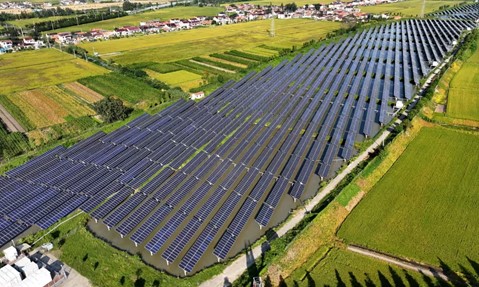
China Set to Lead Green Energy Boom, Accounting for 60% of New Projects in the Next Six Years
IEA Reports China Leading Clean Energy Rollout, Set to Host Half of World's Renewables by 2030
The International Energy Agency (IEA) predicts that China will account for nearly 60% of all renewable energy capacity installed globally from now until 2030. According to the IEA's latest renewable energy report, the pace of renewable energy project rollouts over the next six years will be three times faster than in the previous six years, primarily driven by clean energy initiatives in China and India.
The IEA highlights that the world's renewable energy capacity is projected to surpass the 2030 targets set by various governments, ultimately rivaling the combined power systems of China, the EU, India, and the US. IEA Executive Director Fatih Birol emphasized the significance of this trend by stating, "If I could sum this [trend] up in two words they would be: China, solar."
By the decade's end, China is expected to possess over half of the world's renewable energy capacity. The rapid growth in solar energy has reportedly slowed the country's coal power expansion, which saw the approval of 100 gigawatts (GW) of new power plant permits in 2022 and 2023. In the first half of 2024, China granted permits for only 12 new projects totaling 9.1 GW, according to Global Energy Monitor.
The IEA forecasts that solar capacity growth will represent 80% of all new renewable power added globally by 2030. This acceleration is attributed to declining costs and supportive policies that encourage homes and businesses to invest in solar panels to lower their electricity bills.
Wind power is also beginning to recover from previous setbacks related to rising interest rates and supply chain issues that have affected capital-intensive offshore wind projects. The IEA anticipates that global wind power growth will double between 2024 and 2030 compared to the last six years. In the UK, the government aims to quadruple offshore wind capacity by 2030 while promoting the development of floating wind turbines.
Although floating windfarms are expected to represent a small segment of the offshore wind industry by 2030, a recent report by Renewable UK indicates that by 2050, floating turbines could account for one-third of the UK's offshore wind capacity and contribute £47 billion to the economy, benefiting particularly Scottish and Welsh port communities.
Birol remarked, "Renewables are moving faster than national governments can set targets for. This rapid growth is driven not only by efforts to reduce emissions or enhance energy security but increasingly because renewables now represent the most cost-effective option for adding new power plants in nearly every country."
The ongoing green energy boom indicates that renewables are on track to grow by 2.7 times by 2030, exceeding government-set goals by nearly 25%. However, this growth still narrowly misses the commitment made by global leaders to triple renewable capacity by the decade's end to reduce dependence on fossil fuels.
At last year's UN Cop28 climate talks in Dubai, around 120 world leaders pledged to triple the world's renewable energy capacity by 2030 to significantly cut fossil fuel consumption. Birol stated it is "entirely possible" to achieve this target and outlined three steps global governments can take to expedite the operationalization of renewable energy:
- Recognizing the Importance of Power Grids: Leaders need to acknowledge the critical role of building power grids to accelerate the connection of new renewable energy projects. The IEA reported that at least 1,650 gigawatts of renewable capacity are in advanced development stages and awaiting grid connections, an increase of 150 GW from the previous year.
- Streamlining Project Approval Processes: Countries must reduce the time it takes for renewable energy developers to secure permits for new projects. Currently, wind farm approvals can take up to seven years, while solar farms may take five years.
- Supporting Emerging Economies: International financial institutions should do more to support renewable energy initiatives in emerging and developing economies, which continue to lag behind their developed counterparts. Birol noted, "One of the biggest ‘energy inequalities' I see is in sub-Saharan Africa, where one in two people lack access to reliable electricity. Despite having enormous solar power potential, the entire region has the same solar capacity as Belgium, which is frustrating."